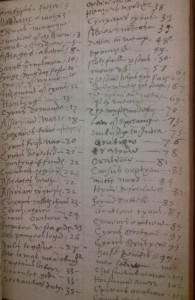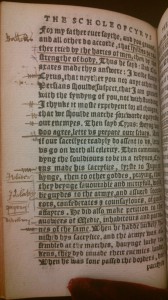A Renaissance Cyrus
¶ 1 Leave a comment on paragraph 1 2 Xenophon’s Cyrus was a well-known and well-liked figure in sixteenth- and seventeenth-century England. Two separate English translations of the Cyropaedia were undertaken between 1550 and 1650, the first by a lowly tutor William Barker (1552 and 1567) who describes himself as ‘a forlorn Scholar, not able to keep credit in learning’, but one who, by translating this work from the Greek ‘do[es] yet entertain [him]self with studies not altogether devoid of learning’; the second by the more accomplished translator Philemon Holland, who had already produced seminal translations of Plutarch’s Moralia (1600) and Livy’s History of Rome (1601), as well as work by the elder Pliny, Suetonius, and the historian William Camden, among others.[i]
¶ 2
Leave a comment on paragraph 2 0
A Greek edition of the Cyropaedia issued in 1613 was (after Chrysostom) only the second text to be printed at the press at Eton established by Sir Henry Savile, Master of the boys’ school and himself a noted translator of Tacitus. But as the first available translation, it was Barker’s that was to have an influence on writers such as Philip Sidney, Edmund Spenser, Christopher Marlowe, William Shakespeare and even King James VI of Scotland and I of England.[ii] Many of them would have known Xenophon in Greek too: English libraries held an array of continental editions of the Cyropaedia in Greek and Latin, as well as important editions of the collected works of Xenophon, and the Cyropaedia seems to have been used in several of the grammar schools and universities as an upper-level Greek teaching text. By kind permission of the Huntington Library, San Marino, California Its influence in this period is most strongly felt in the key humanist disciplines of pedagogy, politics, poetics and historiography.
By kind permission of the Huntington Library, San Marino, California Its influence in this period is most strongly felt in the key humanist disciplines of pedagogy, politics, poetics and historiography.
¶ 3 Leave a comment on paragraph 3 2 A copy of Barker’s 1552[?] translation held at the Huntington library offers an exceptional view of how one Elizabethan read his Xenophon.[iii] Although the short title of this edition is coy – The bookes of Xenophon, only then specifying ‘contayning the discipline, schole, and education of Cyrus the noble Kyng of Persie’ – the running-title gives a better sense of its reception: ‘The Schole of Cyrus’. Most conspicuous is the reader’s creation of a full index (see image 1) of key episodes and instructive moments from Cyrus’ life, complete with his own foliation (numbering of every leaf (rather than page) in the text). Thus we find entries for ‘Education of children’, ‘excess of wyne’, ‘huntyng’ and ‘how to mak men obay’, for example. Supplementing this is a set of references to other biblical, classical and more recent sources on Cyrus, among them Herodotus, the books of Chronicles and Isaiah, and the 1550 English translation of Carion’s Chronicle.
¶ 4
Leave a comment on paragraph 4 0
While many of the annotations are approving of Cyrus’s ‘disciplin’ or ‘chast[ity]’, a certain scepticism about Cyrus’s achievement also emerges, probably through the reader’s familiarity with the Herodotean counter-narrative. Most interesting, it seems to me, are these two strands:  By kind permission of the Huntington Library, San Marino, California
By kind permission of the Huntington Library, San Marino, California
firstly, the annotator’s recurring habit of marking Cyrus’s ability to make people obey him – one of the main things that is remembered to him in turn by Renaissance writers. But the reader takes the opportunity to chastise Cyrus on other occasions: see image 2 for Cyrus’s sacrifices to the gods being deemed ‘idolatry’ and ‘popery’ (a clear indication of our reader’s Protestantism, although interestingly, this is the only instance of such comments among the many occasions on which Cyrus makes sacrifices to the deities).
¶ 5 Leave a comment on paragraph 5 3 Worse still, perhaps, at the end of Book 1, the reader reprimands Cyrus’s imperial ambition, adding to Cyrus’ father’s warning about some men ‘couetynge to bee lordes of all’, the sharp note that ‘cyrus forgott this lesson’.
¶ 6 Leave a comment on paragraph 6 1 My questions, then: how far do the sceptical and the appreciative strands interlock or converge? Does the remembrance of Cyrus’s power to command obedience always invoke the idea of Cyrus’s covetousness, even insatiety, alongside it? Does Renaissance scepticism about Cyrus’s imperial ambition emerge entirely from the Herodotean tradition, or is it cued from the Cyropaedia itself or from more recent readings of the Cyropaedia?
¶ 7 Leave a comment on paragraph 7 0 [i] The reader has not yet been identified, but the annotations seem to date from the early 1560s and the context appears to be educational; it may be a schoolmaster’s copy, perhaps used for teaching. I am grateful to Neil Rhodes for the latter suggestion, and to Norman Sandridge who, perhaps saliently, points out that an attempt at rendering the Greek word ‘Eros’ in the margins alongside Araspes’s discussion of love in Book 6 is mistakenly begun with an eta rather than an epsilon.
¶ 8 Leave a comment on paragraph 8 0 [ii] For a fascinating evaluation of the influence of both Xenophon and Lucian on Christopher Marlowe, see Neil Rhodes, ‘Marlowe and the Greeks’, Renaissance Studies 27 (2013): 199-218. Arguably, the influence of Xenophon’s Oeconomicus in Renaissance England is even more widespread than that of the Cyropaedia. See Lorna Hutson, The Usurer’s Daughter: Male Friendship and Fictions of Women in Sixteenth-Century England (London: Routledge, 1994), especially pp. 17-51.
¶ 9 Leave a comment on paragraph 9 0 [iii] For a more detailled survey of English translations of the Cyropaedia in the period, see Jane Grogan, ‘Barbarous Utopias: Xenophon’s Cyropaedia in the English Renaissance’, Hermathena 183 (2007): 163-74. This discussion is expanded further in my forthcoming monograph, The Persian Empire in English Renaissance Writing, 1549-1622 (Palgrave Macmillan, 2014).
Did Barker translate any other Greek or Latin literature? Does the fact that Holland translated several historians suggest that he believed the Cyropaedia to be historical rather than the fiction of a philosopher or novelist? Were they unaware of Cicero’s pronouncement that Xenophon had composed not history but a “model of just command” (Cicero Letter to Quintus 1.23 , Cyrus ille a Xenophonte non ad historiae fidem scriptus, sed ad effigiem iusti imperii; cuius summa gravitas ab illo philosopho cum singulari comitate coniungitur). I find it interesting to see what company Xenophon’s Cyrus when authors mention him, e.g., Alexander and Caesar in Montaigne (Essay Seven) or Aeneas in Philip Sidney (Defense of Poesy), who was aware of Cicero’s understanding of the work (17).
Yes, indeed,Barker seems to have translated Appian Histories , which might indeed add further to your comment about Holland. (He also translated a racy Italian novella, and published a book of the inscriptions on tombs etc that he had copied out from his Italian travels – very vogueish, apparently, and something I’d love to know more about, if anyone has any suggestions?
But for the early moderns, ‘history’ was the usual term for ‘story’, so although humanists developed fully-fledged historiographical theory, they read their history for much more than simply an account of what happened. To learn usable models and guidelines from what happened in philosophical and political ways is, arguably, of much greater concern to them. As for Cicero’s comment on Xenophon, it was very well-known indeed, particularly asSidney Defence of Poesy translated it (composed 1580s), as you note, that Xenophon has succeeded in producing not a history (as, interestingly, he thinks Justin Epitome of Pompus Trogus’s work has done), but ‘“effigiem iusti imperii”, the portrait of a just empire’.
I like this idea of considering the translations within the wider purview of histories; it situates Xenophon more broadly within its moment, especially the increasing availability of and interest in historiography in the later sixteenth century.